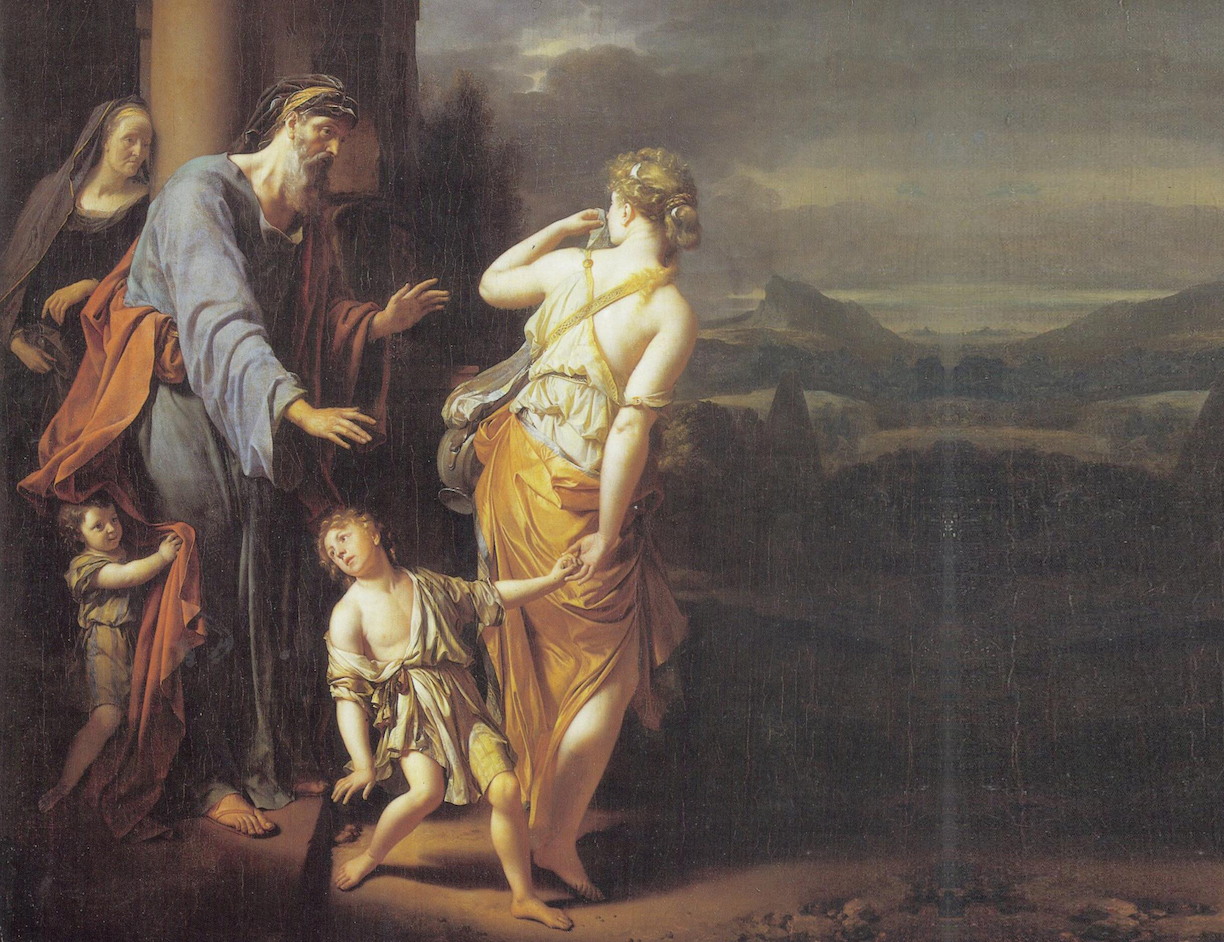 |
| "The Banishment of Hagar and Ishmael" by Adriaen van der Werff |
Yahweh made good on His
promise and Sarah had her son right on time, despite her age and the lack of in
vitro facilities in the Negev. Abraham
got to name him, obviously, since only a man would come up with a name like
Isaac. Abraham, something of a
micromanager, also decided it should be up to him to circumcise the boy, and at
eight days, he did it. No parent in
their right mind would trust a hundred-year-old man to serve as a mohel, but
Abraham was enough of a control freak that he wasn’t bothered by this in the
least. Sarah, who was around her
brother/husband Abraham’s age, was over the moon, and told as many people as
she could.
Sarah nursed Isaac, and on the
day Isaac was to start solid food exclusively, Abraham threw a banquet, and
everyone had fun. This was a problem,
because one of the people who had fun was Ishmael, the son Abraham had had with
Hagar the slave girl, whom Sarah didn’t get along with especially well. Sarah watched Isaac and Ishmael playing, and
didn’t like being reminded of Abraham’s necessary dalliance with the help, so
she had a word with her husband.
“Bubbeleh,” she said, “do you want to make this little maidel happy?”
“But of course,” said
Abraham. “Your wish is my sentence!”
“So happy to hear it, sweetie. Now drive that that shiksa and her little
pisher out of our tent.”
“Hagar? But she’s been a good slave, and that’s still
my son she bore!”
“A good slave? Ha!
This place is a mess! Just look
at the dirt on this floor!”
“But Sarah, the floor is
dirt!”
“So you agree! Now drive Hagar the horrible slave girl out
of here, and her little boy, too! This
family has room for only one male heir, and that’s my little Isaac!”
Abraham fretted about this,
and felt guilty that Sarah might not even allow him to write Hagar a good
reference. “Don’t worry about it,” God
said to Abraham. “They’ll be all
right. Listen to your wife; Isaac will
carry your name. But since the other boy
is your son, too, he also gets to make a great nation. It’s in the blood, after all.” So first thing in the morning, Abraham
generously gave Hagar some bread and water, and not-so-generously sent her and
her son off into the desert.
Hagar wandered around the
Desert of Beersheba and went through the water pretty quickly. When she was out of water, she left her son
under a bush and wandered off, thinking, “I can’t bear to watch him die,” so
she mercifully left him to starve to death in the desert alone. With no job, no prospects and no family, she
sat down and started to sob for some reason.
God heard the boy crying and
sent an angel down to talk to Hagar.
“What’s wrong?” the angel asked, since it really wasn’t clear what she
might be upset about. She didn’t answer,
but somehow the angel sussed it out.
“God heard that boy crying, so go pick him up and take care of him. Don’t fret about your old boss; this boy’s
going to start his own country.” Then
God showed her a well, so she could get them more water.
Career opportunities in the
area being somewhat limited, the boy became an archer when he grew up. He lived in the desert of Paran, and Hagar
continued to look after him, fixing him up with a nice Egyptian girl. The two hit it off famously, and he really
wanted to see her again, and said so.
The Egyptian girl handed jotted down her contact info and said to him,
“Call me, Ishmael.”
And thus a great nation was
born, out in the middle of nowhere. “No
one lives here now,” said Ishmael, “but some day, this place is going to be a
real mecca.” As things turned out, he
wasn’t exactly right about that, but he was close.
Having cleared his house of
any potential sibling rivalry, Abraham was approached by Abimelech and the
commander of Abimelech’s army, Phicol.
They said to Abraham, “Since God is always involved in everything you
do, I want you to swear to us, by God, right here, right now, that you won’t
screw me over, since I’ve been such a good host to you, letting you and your
family squat on my land.
“You bet,” said Abraham. “But look, Abimelech, I’d been meaning to
talk to you. Some of your guys seized
this well. I don’t know who it was,
exactly. You never told me about it, and
I just heard about it today. So here’s
what I’m going to do. I’m going to take
these sheep and these cattle and we’re going to come to an agreement, okay?”
“Okay.”
“I’m putting these seven lambs
on this side of the well.”
“Why?”
“Because that proves that I
dug the well.”
“How?”
“It just does! Now let’s swear an oath.”
“Okay, that makes sense,” said
Abimelech, “I guess. That might as well
be the reason we call this place Beersheba.”
“Huh?” said Abraham. “What’s the connection?”
“Oh, look who’s asking for an
explanation that makes sense!”
Following the Covenant of
Beersheba, Abimelech and Philcol headed back to Philistine land and planted a
tamarisk tree on the spot. He called out
to Yahweh, signaling the beginning of a long stretch among the Philistines.


Comments